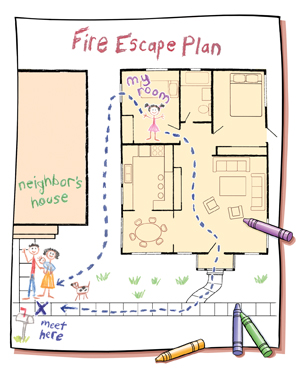A
B
C
D
E
F
G
H
I
J
K
L
M
N
O
P
Q
R
S
T
U
V
W
X
Y
Z
Click a letter to see a list of conditions beginning with that letter.
Click 'Topic Index' to return to the index for the current topic.
Click 'Library Index' to return to the listing of all topics.
Making a Fire Safety Action Plan
Time is critical when fire is involved. Thousands of people, including children, are injured or killed in fires each year. To protect your family in case of a fire in your home, create a fire safety action plan. This teaches your family what to do in a fire and can help save lives. This sheet explains how to make a fire safety action plan.
 |
| Have your child help create a fire safety action plan. This can help him or her learn how to respond in a fire. Make sure the plan shows at least two escape routes from each room. The plan above highlights two exits from the child’s bedroom. |
Creating the plan
Sit down with all family members, including children. Try having the kids help draw the plan of the home. Your plan should:
-
Identify escape routes. There should be 2 ways out of each room. These can be doors or windows. Make sure they are not blocked. Explain to your child that 1 escape route may be blocked, perhaps with fire or smoke. In that case, the second escape route should be used. The plan should also show doors and windows that lead out of the home. If you live in an apartment, make sure the plan shows the location of stairwells that lead downstairs to building exits.
-
Include a meeting place where you will all meet after leaving the home. It should be a safe distance from the home, out of the way of fire crews.
-
Teach kids how to call 911 or emergency services in case of fire. They should call from a cell phone or a neighbor’s phone only after they are safely out of the home. All children should memorize their street address for this purpose.
The plan should have a written list of instructions for kids in case a fire starts. These should include:
-
Stay calm.
-
Yell “fire” several times.
-
Get out of the home right away! Don’t go back in for anything, including family members and pets.
-
Go directly to the designated meeting place. Wait there until told otherwise.
Practice is critical: have fire drills
Practice helps your child learn the fire safety action plan. Have regular fire drills with everyone in the home, at least twice a year. Push the test button to sound the smoke alarm during the practice drill. This helps your child remember what to do in case of a fire and can help them stay calm.
Teach your children about fire safety
Don’t forget to teach your children other important rules about fire safety:
-
Stop, drop, and roll on the floor if clothes catch fire.
-
Crawl to prevent breathing in smoke.
-
Don’t hide from firefighters. They may look scary in protective gear, but all of their instructions should be followed during a fire.
For more information on fire safety, visit the National Fire Protection Association at www.nfpa.org.
Online Medical Reviewer:
Amy Finke RN BSN
Online Medical Reviewer:
Dan Brennan MD
Online Medical Reviewer:
Rita Sather RN
Date Last Reviewed:
10/1/2024
© 2000-2025 The StayWell Company, LLC. All rights reserved. This information is not intended as a substitute for professional medical care. Always follow your healthcare professional's instructions.